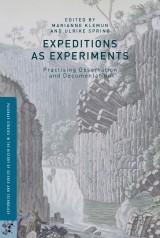Details

Expeditions as Experiments
Practising Observation and DocumentationPalgrave Studies in the History of Science and Technology
|
106,99 € |
|
| Verlag: | Palgrave Macmillan |
| Format: | |
| Veröffentl.: | 18.10.2016 |
| ISBN/EAN: | 9781137581068 |
| Sprache: | englisch |
Dieses eBook enthält ein Wasserzeichen.
Beschreibungen
<p>This collection focuses on different expeditions and their role in the process of knowledge acquisition from the eighteenth century onwards. It investigates various forms of scientific practice conducted during, after and before expeditions, and it places this discussion into the scientific context of experiments. In treating expeditions as experiments in a heuristic sense, we also propose that the expedition is a variation on the laboratory in which different practices can be conducted and where the transformation of uncertain into certain knowledge is tested. The experimental positioning of the expedition brings together an ensemble of techniques, strategies, material agents and social actors, and illuminates the steps leading from observation to facts and documentation. The chapters show the variety of scientific interests that motivated expeditions with their focus on natural history, geology, ichthyology, botany, zoology, helminthology, speleology, physical anthropology, oceanography, meteorology and magnetism. <b></b></p>
<p> </p>
<p> </p>
<div>1. Expeditions as Experiments: An Introduction by Marianne Klemun and Ulrike Spring. - 2. An Idea Ahead of its Time: Jean-Jacques Rousseau’s Mobile Botanical Laboratory by Alexandra Cook. - 3. Experiments and Evolving Frameworks of Scientific Exploration: Jean-André Peyssonnel’s Work on Coral by Jan Vandersmissen. - 4. Japanese Ichthyological Objects and Knowledge Gained in Contact Zones by the Krusenstern Expedition by Yuko Takigawa. - 5. Naturalists at Work: Expeditions, Collections and the Creation of “Epistemic Things” by Kurt Schmutzer. - 6. Mary Barber’s Expedition Journal: An Experimental Space to Voice Social Concerns by Tanja Hammel. - 7. Materialising the Aurora Borealis: Carl Weyprecht and Scientific Documentation of the Arctic by Ulrike Spring. - 8. Going Deeper Underground: Social Cooperation in Cave Expeditions of the Early Twentieth Century by Johannes Mattes. - 9. A Mutual Space? Stereo Photography on Viennese Anthropological Expeditions (1905–45) by Katarina Matiasek. - 10. Traditions, Networks, and Deep-Sea Expeditions After 1945 by Peder Roberts. - 11. It Had to Be Us: Geological Practice, Scientific Authority and Politics in the Expedition to Goa (1960–61) by Teresa Salomé Mota</div><div><br></div><div><br></div><div><br></div>
<p>Marianne Klemun is Professor of Modern History and, from 2006 to 2012, Vice Dean of the Faculty of Historical and Cultural Studies at the University of Vienna, Austria. Her publications include (as Guest Editor) ‘Moved Natural Objects: Spaces in Between’ in <i>HOST - Journal of History of Science and Technology</i>, Vol. 5 (2012).</p>
<p>Ulrike Spring is Associate Professor of History at the Department of Social Sciences at Sogn og Fjordane University College, Norway, and Researcher in the project 'Making Sense of the Aurora' at the Department of History and Religious Studies at UiT – The Arctic University of Norway. </p>
<p>Ulrike Spring is Associate Professor of History at the Department of Social Sciences at Sogn og Fjordane University College, Norway, and Researcher in the project 'Making Sense of the Aurora' at the Department of History and Religious Studies at UiT – The Arctic University of Norway. </p>
This collection focuses on different expeditions and their role in the process of knowledge acquisition from the eighteenth century onwards. It investigates various forms of scientific practice conducted during, after and before expeditions, and it places this discussion into the scientific context of experiments. In treating expeditions as experiments in a heuristic sense, we also propose that the expedition is a variation on the laboratory in which different practices can be conducted and where the transformation of uncertain into certain knowledge is tested. The experimental positioning of the expedition brings together an ensemble of techniques, strategies, material agents and social actors, and illuminates the steps leading from observation to facts and documentation. The chapters show the variety of scientific interests that motivated expeditions with their focus on natural history, geology, ichthyology, botany, zoology, helminthology, speleology, physical anthropology, oceanography, meteorology and magnetism.<br>
Examines a variety of case studies and demonstrates how expeditions have uniquely contributed to scientific understanding where the laboratory could not Presents the traditional expedition as a variation of the laboratory environment for scientific discoveries Explores the ways expeditions have contributed to modern scientific analysis
Diese Produkte könnten Sie auch interessieren:

Beyond: The Astonishing Story of the First Human to Leave Our Planet and Journey into Space

von: Stephen Walker

9,99 €















